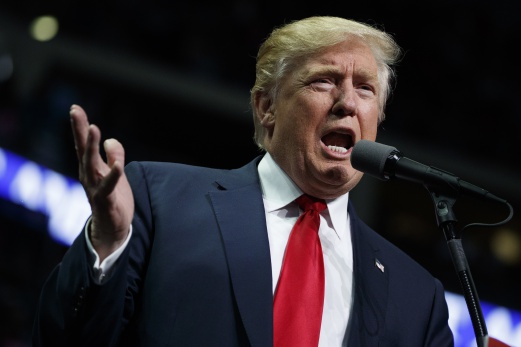 Chinese investors in Beijing: Asian shares have rallied in a remarkable snapback from the shock of Donald Trump’s presidential victory. Photograph: How Hwee Young/EPA
Chinese investors in Beijing: Asian shares have rallied in a remarkable snapback from the shock of Donald Trump’s presidential victory. Photograph: How Hwee Young/EPA
The Dow Jones industrial average hit a record intraday high on Thursday as investors bet that US President-elect Donald Trump would lead a shift away from austerity policies.
Investors are seeing Mr Trump’s policies such higher defence and infrastructure spending, tax cuts and deregulation of banks and as being more business-friendly than Democrat Hillary Clinton’s position of maintaining the status quo.
“The markets are adjusting to a new reality and are giving Trump the benefit of doubt,” said Adam Sarhan, chief executive of Sarhan Capital.
“He does have some problems with immigration and with social issues, but his economic policies, at least in the short-term, are perceived to be stimulative and net good for the economy and that’s why stocks are rallying.”
The dollar jumped to a more than two-week high, while gold turned flat as investors returned to riskier assets such as stocks.
The Mexican peso continued its downward momentum against the dollar as Mr Trump’s policies are considered deeply negative for the country. Just before 2pm Irish time, the Dow Jones industrial average was up 161.69 points, or 0.87 per cent, at 18,751.38. The S&P 500 was up 17.11 points, or 0.79 per cent, at 2,180.37. The index is less than 20 points shy of its record intraday high. The Nasdaq Composite index was up 45.40 points, or 0.86 percent, at 5,296.47.
Dublin
In Dublin, the Iseq was up almost 1 per cent.
US financial and healthcare stocks rose, continuing to hold their positions as the top performers among the 11 major S&P 500 sectors in the post-Trump victory rally.
Consumer staples, utilities and real estate – the defensive parts of the market – remained the big losers.
As investors decipher what a Trump presidency would mean to the financial markets, St. Louis Federal Reserve President James Bullard repeated his call that a single interest rate increase would be adequate for the foreseeable future.
The election result has seen bonds and equities breaking in opposite directions with investors anticipating increased government spending will help corporate bottom lines — and boost stocks — but raise national debt and inflation, which is leading to a wide-ranging sell-off in bonds.
The shift between bonds and equities could represent a turning point in financial markets. For the first time in nearly a decade, markets are not being helped by central bank policy, with the Federal Reserve moving gradually from accommodation to tightening over the past year.
“The market is starting to discount what is likely to be an aggressive fiscal stimulus package comprised of personal and corporate tax cuts as well as infrastructure spending,” said Alan Gayle, director of asset allocation at RidgeWorth Investments. “The exact degree and shape of it are still unknown but ultimately we should see a boost to growth in 2017.”
– (Reuters / Copyright the Financial Times Limited 2016)
[“source-smallbiztrends”]

